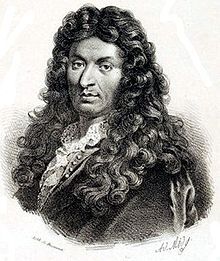November 26, 2012.Jean-Baptiste Lully.The great French Baroque composer, Jean-Baptiste Lully was actually born an Italian on November 28, 1632 in Florence. As a young child, he received little education and learned only the basics of playing the guitar, probably from a Franciscan friar. Apparently, he was pretty good because in 1646 Roger de Lorraine, the chevalier de Guise, took the lucky boy to France where he entered into the service of one of the noblest houses of the kingdom, that of Mademoiselle de Montpensier, the eldest daughter of Gaston, the Duke of Orléans and a brother of Louis XIII.Lully was taught to dance and studied music with Nicolas Métru, an organist and viol player who also taught Couperin.
In 1652, Mlle de Montpensier was exiled (she was one of the key leaders of the Fronde) and Lully left her court.A talented dancer and musician, his skills brought him to the attention of the young King Louis XIV and he became a dancer in the king’s service. After composing some music for the Ballet de la nuit, Louis XIV appointed him leader of the Petits Violons, the king’s own private violin band. Lully’s favor in the king’s court continued to grow and in 1671, he was appointed the Superintendent of Music. Eventually, he was even given complete control over all music performed in France by the king.
The king liked to dance, and Lully composed many ballets for the court. His music changed the genre, introducing much livelier ballets in place of the slow, stately older dances.With the aid of Molière, Lully also created the genre of comédie-ballet, which mixed spoken plays with dance and music numbers.As Louis XIV aged, however, his interest in ballet, as well as his ability to dance, waned and in response Lully turned his attention on operas.At that time the Italian opera, that of Monteverdi, Cavalli, and even lesser composers, reigned supreme throughout Europe (the first public opera house was opened in Venice in 1637).Still, Lully found it unsuitable for the French language.In his operas Lully removed the divisions between recitative and aria and, using good librettos by the dramatist Philippe Quinault, made the story move faster.It is his operas that made Lully the foremost composer in France.
In January of 1687, while conducting a performance, Lully struck his toe with a long staff that he was using to beat time.The wound became gangrenous, yet he refused to have the toe amputated.The gangrene inevitably spread and on March 22, Lully died from the injury.
We’ll hear the aria Belle Hermione, hélas, hélas from Cadmus et Hermione, a "musical tragedy" on the libretto by Philippe Quinault.It is sung by the wonderful French baritone Gérard Souzay, with Orchestre de la Société du Conservatoire Paris (courtesy of YouTube, here).
Jean-Baptiste Lully 2012
November 26, 2012. Jean-Baptiste Lully. The great French Baroque composer, Jean-Baptiste Lully was actually born an Italian on November 28, 1632 in Florence. As a young child, he received little education and learned only the basics of playing the guitar, probably from a Franciscan friar. Apparently, he was pretty good because in 1646 Roger de Lorraine, the chevalier de Guise, took the lucky boy to France where he entered into the service of one of the noblest houses of the kingdom, that of Mademoiselle de Montpensier, the eldest daughter of Gaston, the Duke of Orléans and a brother of Louis XIII. Lully was taught to dance and studied music with Nicolas Métru, an organist and viol player who also taught Couperin.
service of one of the noblest houses of the kingdom, that of Mademoiselle de Montpensier, the eldest daughter of Gaston, the Duke of Orléans and a brother of Louis XIII. Lully was taught to dance and studied music with Nicolas Métru, an organist and viol player who also taught Couperin.
In 1652, Mlle de Montpensier was exiled (she was one of the key leaders of the Fronde) and Lully left her court. A talented dancer and musician, his skills brought him to the attention of the young King Louis XIV and he became a dancer in the king’s service. After composing some music for the Ballet de la nuit, Louis XIV appointed him leader of the Petits Violons, the king’s own private violin band. Lully’s favor in the king’s court continued to grow and in 1671, he was appointed the Superintendent of Music. Eventually, he was even given complete control over all music performed in France by the king.
The king liked to dance, and Lully composed many ballets for the court. His music changed the genre, introducing much livelier ballets in place of the slow, stately older dances. With the aid of Molière, Lully also created the genre of comédie-ballet, which mixed spoken plays with dance and music numbers. As Louis XIV aged, however, his interest in ballet, as well as his ability to dance, waned and in response Lully turned his attention on operas. At that time the Italian opera, that of Monteverdi, Cavalli, and even lesser composers, reigned supreme throughout Europe (the first public opera house was opened in Venice in 1637). Still, Lully found it unsuitable for the French language. In his operas Lully removed the divisions between recitative and aria and, using good librettos by the dramatist Philippe Quinault, made the story move faster. It is his operas that made Lully the foremost composer in France.
In January of 1687, while conducting a performance, Lully struck his toe with a long staff that he was using to beat time. The wound became gangrenous, yet he refused to have the toe amputated. The gangrene inevitably spread and on March 22, Lully died from the injury.
We’ll hear the aria Belle Hermione, hélas, hélas from Cadmus et Hermione, a "musical tragedy" on the libretto by Philippe Quinault. It is sung by the wonderful French baritone Gérard Souzay, with Orchestre de la Société du Conservatoire Paris (courtesy of YouTube, here).